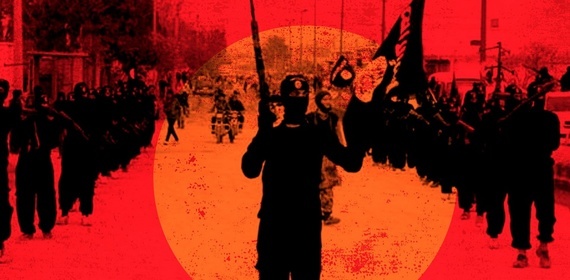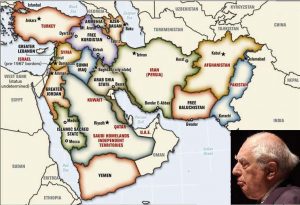Wood’s “What ISIS Really Wants,” published in the March 2015 edition of The Atlantic, has quickly become the most widely read article on the militant group. Indeed, it is becoming the most read article ever published by The Atlantic.
Popular as it is, Wood’s essay is deeply flawed and alarmingly tone-deaf – dangerously so. What is so objectionable about Wood’s essay is encapsulated in his statement: “The reality is that the Islamic State is Islamic. Very Islamic.” While Wood acknowledges that “nearly all” Muslims of the world reject ISIS, ultimately his thesis is that the atrocities committed by the group have a theological basis in Islam. In support of his thesis, Wood cites Princeton academic, Bernard Haykel, who not only agrees that ISIS is “very Islamic,” but even goes so far as to say that those Muslims who denounce ISIS as un-Islamic are either ignorant about Islam or are simply being politically expedient by deliberately whitewashing the legal and historical dimensions of their religion.
By characterizing ISIS as Islamic, Wood and Haykel in effect, if not intent, attribute cruel beheadings, wanton massacre, and all other manner of savagery to Islam. In their minds, such an attribution is neither factually incorrect nor particularly damaging to “nearly all” Muslims who reject ISIS. But are Wood and Haykel too naïve to understand that by making such attributions to Islam, they ipso facto implicate and foment suspicion about all those who subscribe to Islam?
Of course, their attributions are factually incorrect and conceptually confused as we will discuss below. But their mistakes are especially egregious given the current climate of anti-Muslim bigotry. In light of the recent hate crimes directed towards the American and European Muslim communities, Wood’s piece is tantamount to shouting “Fire!” in a crowded theatre and, therefore, deserves a thorough rebuttal, if nothing else.
Below are twenty-one points that not only critique Wood’s essay and ISIS’s ideology but also take stock of the larger discourse surrounding Muslims, the War on Terror, and the intersection of government policy and the study of Islam in Western academia.
1. The Banality
By now, the McCarthyist script should be mind-numbingly familiar. Group A argues that Muslim crazies – in this case ISIS – are acting in accordance with the tenets of Islam, i.e., they’re “very Islamic.” Group B – in this case Muslims along with non-Muslim specialists – denies this, marshaling all manner of theological, historical, and sociological evidence. Group A, without skipping a beat, accuses Group B of being apologists for extremism and demands that Group B denounce the crazies (ignoring the copious denunciations Group B has already made in the past).
2. The Witch-Hunt
This is the back and forth playing out over and over again ad nauseum since 9/11, and, much like the McCarthyism of the past, its primary purpose is to restrict dissent and silence political criticism of government authorities. Few realize that an integral strategic component of the “Global War on Terror” and the invasion and occupation of countries like Iraq and Afghanistan by Western powers is the Islamophobic witch-hunt at home, which stigmatizes and prosecutes actual and would-be opponents to such foreign policy and shores up public support for more war against the “Muslim enemy.” That was the raison d’être of McCarthyism during the Cold War, and now American Muslims are the new communists in our midst.
3. The Profiling
Even as President Obama solemnly declares that ISIS and terrorism have nothing to do with Islam and the Muslim community at large, his administration still oversees a “Countering Violent Extremism” summit that primarily focuses on the American Muslim community. Despite the fact that only a tiny fraction of the extremist violence in the US is perpetrated by Muslims, the Obama administration and other federal and local agencies have made it crystal clear that it is primarily the average American Muslim who is the object of their spying, surveillance, entrapment, etc. And for some, this is still not enough.
4. The Diversion
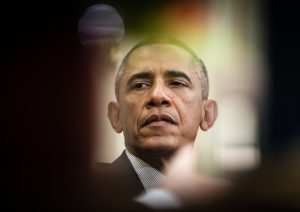 Speaking of President Obama, remember how just a couple of weeks ago he sparked controversy by drawing parallels between ISIS and historical Christian violence, e.g., the Crusades, Jim Crow, etc.? How convenient for the President to highlight Christian violence in previous eras while ignoring all the more recent, salient examples of violence, death, and destruction wrought by, among other things, his drone program. By focusing on the crimes of others and the threat from without, the administration is able to maintain a façade of innocence in the face of all the injustice rocking the nation, e.g., the burgeoning prison population, an increasingly brutal and militarized police force, the slow death of the American middle class, the widening wealth gap in the face of Wall Street lawlessness, the increasing influence of money in elections and public policy, and a host of other injustices eating away at our country. But pay no attention, people. There is a grave threat over yonder!
Speaking of President Obama, remember how just a couple of weeks ago he sparked controversy by drawing parallels between ISIS and historical Christian violence, e.g., the Crusades, Jim Crow, etc.? How convenient for the President to highlight Christian violence in previous eras while ignoring all the more recent, salient examples of violence, death, and destruction wrought by, among other things, his drone program. By focusing on the crimes of others and the threat from without, the administration is able to maintain a façade of innocence in the face of all the injustice rocking the nation, e.g., the burgeoning prison population, an increasingly brutal and militarized police force, the slow death of the American middle class, the widening wealth gap in the face of Wall Street lawlessness, the increasing influence of money in elections and public policy, and a host of other injustices eating away at our country. But pay no attention, people. There is a grave threat over yonder!
5. The Racism
At some point in American history we, as a society, decided it was unseemly, hateful, and downright false to attribute the bad actions of a few to an entire minority race or demographic. Though some have yet to get the memo, it is ludicrous to try to understand, for example, disproportionately high black incarceration rates by arguing that black culture has a violent strain, and, even though “nearly all” blacks denounce criminal activity, nonetheless muggings, gang violence, drug dealing, etc., is “very black.” No one in academia, media, or elsewhere would make such attributions in the case of African Americans vis-a-vis blackness or Jews vis-a-vis Judaism, but, in the case of Muslims vis-a-vis Islam it is, apparently, still open season.
6. The Fear
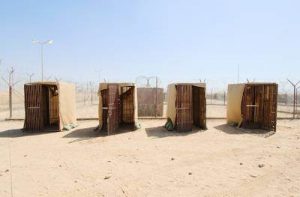
Segregation Cells, Abu Ghraib, Iraq. Photo Credit: Richard Ross
Going back to The Atlantic piece, it is hard to tell how Wood’s argument differs substantively from those of bona fide anti-Muslim bigots like Pamela Geller or Steve Emerson, who profit handsomely from their crass fear-mongering. Of course, Wood is savvy enough to package his conclusions in the veneer of objective reporting – quoting heavily from a single Princeton scholar as well as interviewing a handful of colorful would-be militants “in the field,” i.e., coffee shops in London and Melbourne. But for all the gravity Wood tries to muster, references to Orwell and Hitler notwithstanding, the takeaway in the end is still essentially “Islam is the problem.” Is it any wonder that the biggest Islam and Muslim haters of the world have been tripping over themselves to gush over Wood and his “unparalleled expertise”?
7. The Sowing
Wood insists that ISIS’s apocalyptic theology is pivotal in understanding the origins and behavior of the militant group. But, beliefs don’t arise in a vacuum. Isn’t it just a little bit relevant to consider the hellish conditions the US, UK, and other Western powers created in the region in the last thirty years, by way of the First Gulf War, the years of economic sanctions on Iraq, the 2003 invasion, and subsequent military occupation? Isn’t it slightly pertinent that many ISIS militants were captives in US detention centers, like Abu Ghraib, experiencing all kinds of lurid humiliation, abject torture, and vile sexual abuse at the hands of their “liberators”? Isn’t it at least somewhat germane that many eventual ISIS militants witnessed their communities decimated, their family members raped and massacred, and their newborns disfigured with nightmare-inducing birth defects caused by the US military’s use of depleted uranium weapons against civilians? And beyond Iraq, isn’t the proxy war in Syria that has resulted in the brutal massacre of hundreds of thousands of civilians apropos to the spread and support of ISIS in that region?
8. The Reaping
In short, ought it be surprising that if we rain down a veritable apocalypse upon a people, they just might start adopting apocalyptic views? A simple question: Why has a group like ISIS come to power in lands that have been subjected to continual political strife, civil war, and bloodshed? All else being equal theologically, had the US not pummeled that region for decades, would ISIS have ever arisen? Normally, there would be nothing inherently objectionable about Wood focusing on ISIS’s religious beliefs in lieu of these historical and sociological considerations. But, in this case and given the political climate, Wood’s omission purely serves the interests of power and effectively exonerates US war-mongering at the expense of its victims, namely Muslims at home and abroad.
9. The Deflection
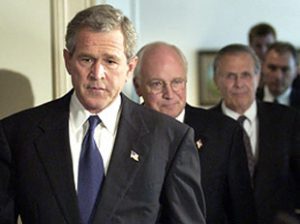
Along those lines, it is not surprising that the same Washington punditry and policy analysts that cheered on the 2003 Iraq invasion would now, in 2015, much prefer us to think of the rise of ISIS as having everything to do with archaic religious interpretations and nothing to do with the grossly incompetent, highly immoral foreign “intervention” they supported that tilled the soil for the seeds of ISIS’s extremism to take root.
10. The Coffee Shops
Wood can’t be bothered with that wider context. What interests him is chatting theology with armchair militants over lattes. Isn’t it notable that Wood couldn’t find ISIS supporters in the US, but had to travel across the world to meet them in the UK and Australia? Isn’t it notable that, for someone who is so interested in theology, Wood couldn’t be bothered to meet with a single mainstream Muslim theologian of repute? Isn’t it notable that Wood conducted his interviews in coffee shops and not mosques? Maybe it is because self-taught, fringe cartoon characters like Anjem Choudary and Musa Cerantonio don’t have mosques or any kind of institutional presence, let alone authority, in the Muslim community. Not that that is what Fox News wants you to think, as it parades these agent provocateurs on national media instead of allowing them to asphyxiate into anonymity.
11. The Sophomore
Wood ultimately admits, “[ISIS supporters] lectured me garrulously and, if one accepts their premises, convincingly. To call them un-Islamic appears, to me, to invite them into an argument that they would win.” Perhaps Wood does not have the humility to recognize that it really doesn’t say much that he, personally, can’t win an argument with ISIS fanboys about the Islamic-ness of ISIS. Perhaps Wood should leave such arguments to people in the know. One would expect the fact that not a single Muslim scholar of repute, from across the theological schools of Islam and spanning the entirety of the Muslim world, has ever issued a fatwa sanctioning ISIS should carry weight in determining legitimate application of the word “Islamic.”
12. The Academic
Wood quotes Princeton academic, Bernard Haykel: “People want to absolve Islam,” [Haykel] said. “It’s this ‘Islam is a religion of peace’ mantra. As if there is such a thing as ‘Islam’! It’s what Muslims do and how they interpret their texts.” Wood could have saved everyone a lot of time by starting his essay with this. If Islam is nothing above and beyond what particular Muslims do and the idiosyncrasies of how they interpret religious texts, then, by that definition, it is trivially true that ISIS is Islamic. If the Queen of England became Muslim and somehow interpreted the Quran as telling her to record a rap album, would we then consider the release of “Royal Hustling LP” an Islamic act?
13. The Bait and Switch
To make matters worse, there is a central conceptual inconsistency in the essay that undermines Wood’s entire thesis. The problem is Wood and Haykel equivocate on the word “Islamic.” Wood uses “Islamic” in an explanatory sense – by characterizing ISIS as “Islamic,” Wood means that studying Islam and its “intellectual genealogy” will explain ISIS’s origins and behavior in a way that can inform policy decisions and military strategy. This is because, in his view, ISIS’s theology, in some sense, proceeds from the broader Islamic paradigm, so by understanding the latter, one gains insight into the former. Haykel, in contrast, uses “Islamic” in a descriptive sense. For Haykel, ISIS being “Islamic” merely amounts to: “They are Muslims and they have an interpretation of Islamic texts.” But, this vanishingly thin descriptive notion of Islam says nothing about whether ISIS’s theology proceeds from or is even connected to a broader Islamic paradigm. In fact, Haykel explicitly denies that such a broader paradigm even exists. So that explanatory dimension upon which Wood’s entire essay is based disappears. By equivocating on these two senses of the word “Islamic,” Wood attempts to gain academic legitimacy from Haykel while also positioning his essay as politically and strategically significant – in essence, having his cake and eating it too.
14. The Goatee
By the way, what a colorful picture Wood paints of Haykel, with his “unplaceable foreign accent,” his “Mephistophelian goatee,” standing there in front of an array of Arabic tomes, gazing into the abyss with all the solemnity of a man who knows too much. Coincidentally, Haykel is not the first “Bernard” to come out of Princeton with his fingers on the pulse of Muslim fanaticism. While Bernard Lewis did a fine job advising Bush in all the success that was the Iraq War, maybe Haykel can curry enough favor to win an advisory role in America’s next great excursion.
15. The Sacred Way
The present debate about the Islamic-ness of ISIS is premised on a fundamental confusion about the nature of Islamic Law. Islamic Law is not enshrined in one particular text or the opinions of one particular medieval scholar. In fact, rather than characterizing Sacred Law as textual — akin to codified law on aged parchment or commandments on stone tablets sent from on high —it is far more accurate to understand it as a methodology that synthesizes a variety of textual and non-textual indicants. While a text is stagnant, a methodology is dynamic. By emphasizing Islamic Law as methodology, several things are accomplished:
16. The Literal
First, we avoid the cliched “literal vs. non-literal” dichotomy used to reductively and inaccurately characterize “extremists” and “moderates.” To understand how useless this distinction is, consider this. What does it mean to be a “literalist” about the 1st Amendment of the US Constitution? Should America maintain its “literalism” about the 2nd Amendment given that the US has one of the highest rates of gun violence out of all developed nations? Or, is North Korea being “literal” or “figurative” in its interpretation of the UN Declaration of Human Rights, and which interpretation is most consistent with enlightenment?
17. The Medieval
Second, we also avoid the confusion about “medieval vs. modern.” As a methodology, Islamic Law is inherently (and, in certain cases, necessarily) sensitive to a variety of contemporary local and global variables. Certain juristic legal opinions (fatwas), for example, are invalidated if present day conditions differ from the cultural context in which the opinions were originally issued. In this way, Islamic Law as a methodology is inexorably contemporaneous. (Of course, all legal systems are inexorably contemporaneous in that they have to keep up with social developments and accommodate novel legal scenarios that continually arise. It’s no different for Islamic Law.)
18. The Inconsistency
Third, if Islamic Law is a methodology, with well-defined principles and a consistent internal logic, then it becomes clear who is objectively Islamic and who is not. For Wood and Haykel, all it takes for a Muslim group to be “very Islamic” is that they use the language of the Quran and hadiths in articulating their interpretation of Islam. But consider this analogy. Countries like Saudi Arabia, Liberia, the UAE, China, Syria, and Iran have signed and ratified many international human rights treaties. Their political leaders also wax poetic about the importance of freedom and democracy with a fervor that would make Thomas Jefferson himself blush. But does the use of such liberal democratic language make these political regimes, in actuality, liberal or democratic? Of course no one would agree with this, but using the logic of Haykel and his cohorts in the academy, who’s to say otherwise? The underlying bias is that religions, like Islam, have no objective existence above and beyond the beliefs and actions of individual adherents, whereas Western normative systems, like secular liberalism, do have objective content that is not open to limitless interpretation. This is the bald-faced double standard that allows the ivory tower to remain coyly noncommittal about the un-Islamic-ness of ISIS.
19. The Methodology
Finally, then, how is ISIS decidedly not Islamic? Well, what characterizes ISIS’s approach to Islamic Law is a glaring lack of methodology beyond textual cherry-picking. They cite broadly, scanning classical Muslim texts for whatever expediently fits their agenda. But this post hoc scrapbooking is the exact reverse of legitimate juristic methodology. The proper derivation of Islamic legal opinions, as practiced for centuries by Muslim jurists, begins from general methodological principles (usul al-fiqh), takes into account the relevant scriptural and extra-scriptural indicants, and then arrives at specific rulings. ISIS, of course, has no usul al-fiqh, no consistent methodology, and, hence, no connection to Islamic Law. And this is precisely what Muslim scholars around the world have been saying in denouncing and debunking ISIS’s “McSharia.” A casual observer, like Wood, may be impressed with all the citations ISIS propagandists have up their sleeves, but anyone with a basic understanding of the way Islamic Law works will know better.
20. The Point
Finally, before anyone accuses us of “missing the point” of Wood’s expose, let us clarify something. As Professor Haykel intimated, and we agree, Islamic Law as a comprehensive legal system is not going to perfectly align with all dictates of liberal secularism. And why should it? Islam may be illiberal in certain respects, but so is classical Confucianism, historical Jainism, traditional Catholicism, Orthodox Judaism, Eastern Orthodox Christianity, Sub-Saharan Fulani Tribal code, and countless other moral and legal systems that don’t share the idiosyncrasies of one particular philosophical outlook developed by a handful of seventeenth-century British and French thinkers.
That doesn’t mean Muslims or Catholics or Orthodox Jews cannot live peacefully in secular liberal democracies. Even so, some take it as a given that to be even slightly illiberal is to be a barbarian. This, of course, smacks of ethnocentrism and dehumanization of the “other,” things we would think card-carrying liberals would elide. Nonetheless, we should understand that, as a point of fact, there is a vast and categorical distance between those certain illiberal areas of Islam and the atrocities of ISIS, and no amount of hermeneutical gymnastics can bridge that gap.
21. The End
As much as commentators want to portray ISIS as authentically Islamic, the facts tell a different story. Instead of insight, The Atlantic peddles the same stereotypes of the “Muslim savage” and Islamic Law while pretending to do serious journalism. The Christian conservative mob was just recently riled up by the feature film of a certain Mr. Eastwood. Now, thanks to another Wood, the other side of the socio-political spectrum can join the madness.


